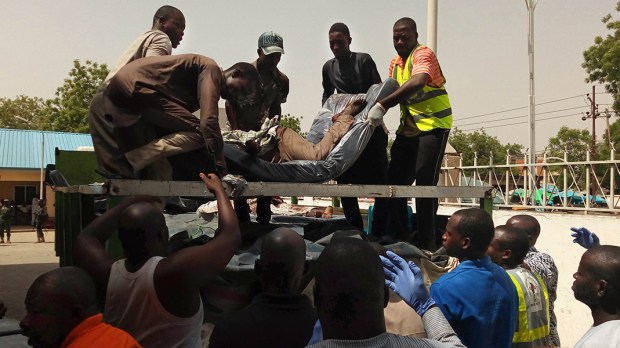A twin suicide bombing has killed at least 27 people, possibly dozens more, at a mosque in northeastern Nigeria.
The attack, which also left 58 wounded, is thought to be the work of the Islamist group Boko Haram, which has targeted the region repeatedly in recent years.
“The bombings took place around 1 p.m. on Tuesday during afternoon prayers in Mubi, a town roughly 120 miles north of Yola, the capital of Adamawa State,” the New York Times reported. “The suicide bombers, two young men, detonated a first bomb after prayers began and a second one outside as people fled, according to the police.”
Al Jazeera put the death toll much higher, at 86, based on interviews with workers at a local cemetery, where victims were laid to rest soon after the attack.
Yemi Osinbajo, Nigeria’s vice president, said in a statement that the government was “shocked and outraged” by the bombings.
“This desecration of a place of worship by criminals is tragic and condemnable,” Osinbajo said, adding that the authorities were working “to beef up security” in and around Mubi, “especially markets and places of worship.”
The Times explained that Mubi, a city of about 175,000 people near the border with Cameroon, is among a number of towns and villages where Boko Haram fighters once held control before being ousted by the military:
Boko Haram, a radical Islamist group that has waged war for the past nine years in Nigeria and in neighboring countries, has sent suicide bombers in a wave of recent attacks on mosques, checkpoints, markets and even camps for some of the nearly two million people uprooted from their homes because of the conflict. The suicide bombers, many of whom are women and children, have been sent to attack Maiduguri, the capital of Borno State and the city where the Boko Haram movement was founded, as well as smaller towns and villages across the countryside and settlements in neighboring countries.
Edward Kallon, the United Nations humanitarian coordinator in Nigeria, urged the government of Nigeria to “step up the protection of innocent people.”
In the first visit to the White House by an African leader since Donald J. Trump took office, the president touted the sale of a dozen A-29 Super Tucano warplanes to Nigeria, which he said will help in the country’s fight against Boko Haram.
But, the Times pointed out, the terrorist group no longer fields large groups of fighters in the open, but uses lone suicide bombers to attack civilians instead, as in Tuesday’s attack.

